Makhfirat Khidirzoda: Tajikistan Has a Stable Legal and Regulatory Framework for Holding Presidential Election at a High Organizational Level
Read also
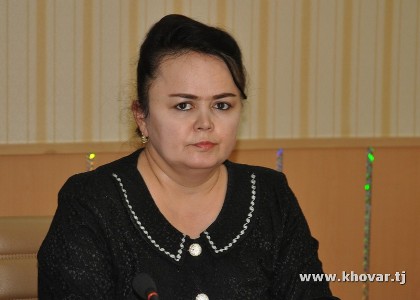
DUSHANBE, 28.08.2020. (NIAT Khovar) – The Central Commission for Elections and Referenda (CCER) of Tajikistan in collaboration with the Ministry of Justice has organized a course to train experts on electoral issues, which was attended by 25 people among whom were scientists in the field of law, politics, as well as university and institute professors. These experts will assist in the electoral process in advancing CCER’s work. Similar preparatory courses have also been also organized throughout the country, wherein more than 120 local experts have been trained. This information was provided by CCER member, Professor Makhfirat Khidirzoda in an interview with Khovar’s correspondent Sofia Shoik about the upcoming presidential election on October 11.
Shoik: Could you comment on the essence of the presidential elections and their role in the socio-political and economic life?
Khidirzoda: Experience shows that the period of independence for Tajikistan is characterized by the formation of completely new socio-political relations, a new system of values, ensuring the sustainability of the development of national statehood. In this regard, it should be noted that the presidential institution is established as an institution for managing society through elections. Presidential elections have a special status in the culture of our statehood and are held within the framework of international standards and national electoral legislation.
It is known that elections serve as a mechanism which ensures that the people are the only source of power and the development of democracy in the country.
Presidential elections, as the most important political event, are regulated within the framework of the Constitution and the electoral legislation. For the purpose of legislative regulations of the process, the Constitutional Law ‘On the Presidential Elections’ was adopted. It is worth noting that today there is a solid regulatory and legal framework that makes it possible to hold this important event at a high political level in compliance with international standards and norms.
After improving the structure in 2019, the CCER is already holding its second elections. Can we say that the new Commission’s composition has already gained some experience in this direction?
Yes, of course. The CCER has carried out certain work with the aim of holding presidential elections at a high political level. In particular, after the appointment of the date of the elections, the Schedule Plan of the main activities for the organization and conduct of presidential elections was approved, in accordance with which all stages of the elections were determined. Additionally, in order to strengthen the advisory and instructor activities, the publication of the Constitutional Law ‘On the Presidential Elections’ has been established, more than 20 instructions, reference books and manuals on various issues of the electoral process have been developed and approved, which are sent to the lower election commissions and other subjects of the electoral process.
In order to activate the role of youth and women as an active segment of the electorate, plans for joint work with the committees for women and family affairs, youth and sports were also developed and approved.
Also, in order to ensure the rights of persons with disabilities in elections, the CCER developed and approved the ‘Instruction for election commissions on ensuring the rights of persons with disabilities in the presidential elections,’ in accordance with which the tasks of district and precinct electoral commissions for creating conditions for exercising the electoral rights of persons with disabilities are determined. The ‘CCER’s Action Plan to ensure the rights of persons with disabilities in the presidential elections’ was also approved.
In order to ensure effective cooperation of election commissions with civil society institutions during the presidential elections, the Commission has developed and approved the ‘Guidelines for cooperation with civil society during the presidential elections.’
In order to ensure transparency in the process of organizing and holding elections, the CCER uses new information platforms and modern methods of cooperation with the media. For this purpose, a CCER’s temporary Press Center was organized. In order to use new information platforms in the presidential elections, the Commission’s website has been activated, where the necessary information on the CCER activities and the electoral process in general is posted in a timely manner.
The informational mobile application ‘Election of the President of the Republic of Tajikistan-2020,’ is also functioning. A two-way electronic communication has been established on the exchange of information with the district commissions.
A joint work plan with the Media Academy has been developed and is being implemented to conduct a training seminar that addresses the use of social networks during the election period and joint activities to cover the electoral process.
By the Commission’s decree dated 7th August of this year, 68 electoral districts were organized in the country. The district election commissions were created on August 10. Also, by the CCER’s decision 39 polling stations were established in 29 countries.
What work has been carried out by the Commission to improve the legal and political culture of the electorate, which is of importance in the process of electing the president?
In fact, the legal and political culture of voters is one of the important factors in the organization of the presidential elections.
Elections, as a political event, bring various forces to the field of the struggle for power. Citizens who have the right to vote play the role of judges in this struggle, make decisions by assessing the activities, skills, experience, capabilities and political will of the elected subjects, and consider their further functioning as a subject exercising political power.
One of the indicators that personifies the level of political and legal maturity of society in this process is the political behavior of citizens. Each election is a historical and political lesson for all participants. Citizens in elections are considered the only source of power; the fate of candidates, political parties and the Tajik state depends on their will.
The level of education and political culture developing in society is expressed in the form of political behavior of voters. Observers distinguish two forms of political behavior, one of which is an active form of political participation, and the other is political nihilism, which expresses the inactive position of the subject of politics on his participation in political processes. Therefore, general electoral principles that meet international standards require ensuring freedom and voluntariness of choice for every citizen. Respect for the electoral rights of the citizen is also an integral part of the electoral culture.
In order to increase the level of legal education and culture of voters, the CCER developed and approved a plan for holding seminars in several stages with various strata of society, including women and youth, employees of ministries and departments, students and teachers of higher professional education institutions, and persons with disabilities. CCER members, scientists in the field of political science and law, experts will be involved in the seminars.
It is known that the country has seen serious changes in the direction of the formation and development of the national system of electoral legislation since its independence. In this regard, I would like to talk about the changes made to the legislation of the presidential elections.
Indeed, in the five years between the parliamentary elections and the seven-year period of the presidential elections, the electoral legislation has significantly improved, which corresponded to the Constitution and the requirements of society.
Presidential elections have a number of specific features. While considering the existing practice of observing elections and presenting recommendations, some changes and additions were made to bring them in line with international standards. The amendments and additions made relating to the age qualification, the activities of the authorized bodies of the election organizers, the procedure for the participation of national and international observers, ensuring the electoral rights of citizens and other important aspects of electoral legislation, contribute to the open and democratic conduct of elections.
Changes in the electoral legislation in Tajikistan indicate that public relations in this direction are constantly improving, and modern mechanisms are being introduced to ensure the electoral right of citizens.
What do you expect from the upcoming election?
I hope that the presidential election will be held at a high political level in compliance with a high political and legal culture and will fully contribute to the strengthening of social integration in society and the further development of Tajikistan. I hope that Tajiks, possessing high legal education and culture, will take an active part in this important political event.











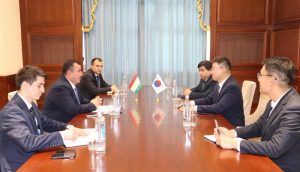 Tajikistan and the Republic of Korea sign $6.5 million negotiations protocol for digitalisation project
Tajikistan and the Republic of Korea sign $6.5 million negotiations protocol for digitalisation project Lonely Planet Includes Tajikistan among the World’s Best Travel Experiences
Lonely Planet Includes Tajikistan among the World’s Best Travel Experiences Emomali Rahmon and Xi Jinping Highlight Significance of Launching Direct Passenger Flights between Dushanbe and Beijing
Emomali Rahmon and Xi Jinping Highlight Significance of Launching Direct Passenger Flights between Dushanbe and Beijing American Environmentalist Caroline Gleich Praises Tajikistan’s Leadership in Glaciers’ Protection
American Environmentalist Caroline Gleich Praises Tajikistan’s Leadership in Glaciers’ Protection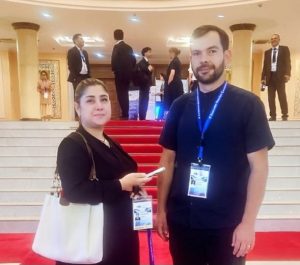 Tajikistan Provides Key Platform for Science–Policy Dialogue on Glacier Preservation, Says UCA Researcher
Tajikistan Provides Key Platform for Science–Policy Dialogue on Glacier Preservation, Says UCA Researcher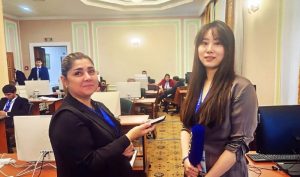 CGTN Journalist Praises Tajikistan’s Leadership on Glaciers’ Issues and Highlights China-Tajikistan Cooperation
CGTN Journalist Praises Tajikistan’s Leadership on Glaciers’ Issues and Highlights China-Tajikistan Cooperation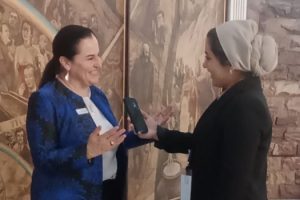 UN Women Official Stresses the Role of Women in Climate Action at Glaciers’ Conference in Dushanbe
UN Women Official Stresses the Role of Women in Climate Action at Glaciers’ Conference in Dushanbe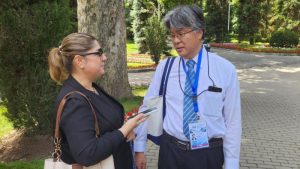 Japanese Researcher Highlights Tajikistan’s Role in Regional Water Security at High-Level Glaciers’ Conference
Japanese Researcher Highlights Tajikistan’s Role in Regional Water Security at High-Level Glaciers’ Conference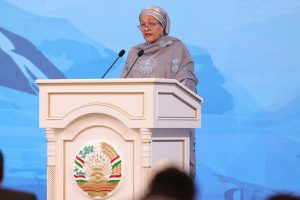 “This is Not Just Ice – This is Life”: UN Deputy Chief Calls for Urgent Action at Glaciers Conference in Dushanbe
“This is Not Just Ice – This is Life”: UN Deputy Chief Calls for Urgent Action at Glaciers Conference in Dushanbe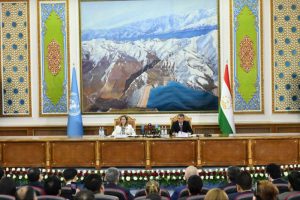 Dushanbe Hosts Landmark International High-Level Conference on Glaciers’ Preservation
Dushanbe Hosts Landmark International High-Level Conference on Glaciers’ Preservation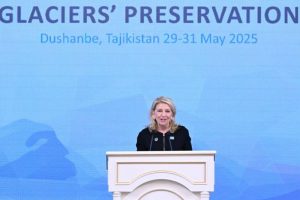 The Climate Crisis Is Primarily a Crisis of Children’s Rights
The Climate Crisis Is Primarily a Crisis of Children’s Rights Chinese Scientist Highlights Glacier Retreat as a Tangible Reality for Tajikistan, the Region, and the World
Chinese Scientist Highlights Glacier Retreat as a Tangible Reality for Tajikistan, the Region, and the World














